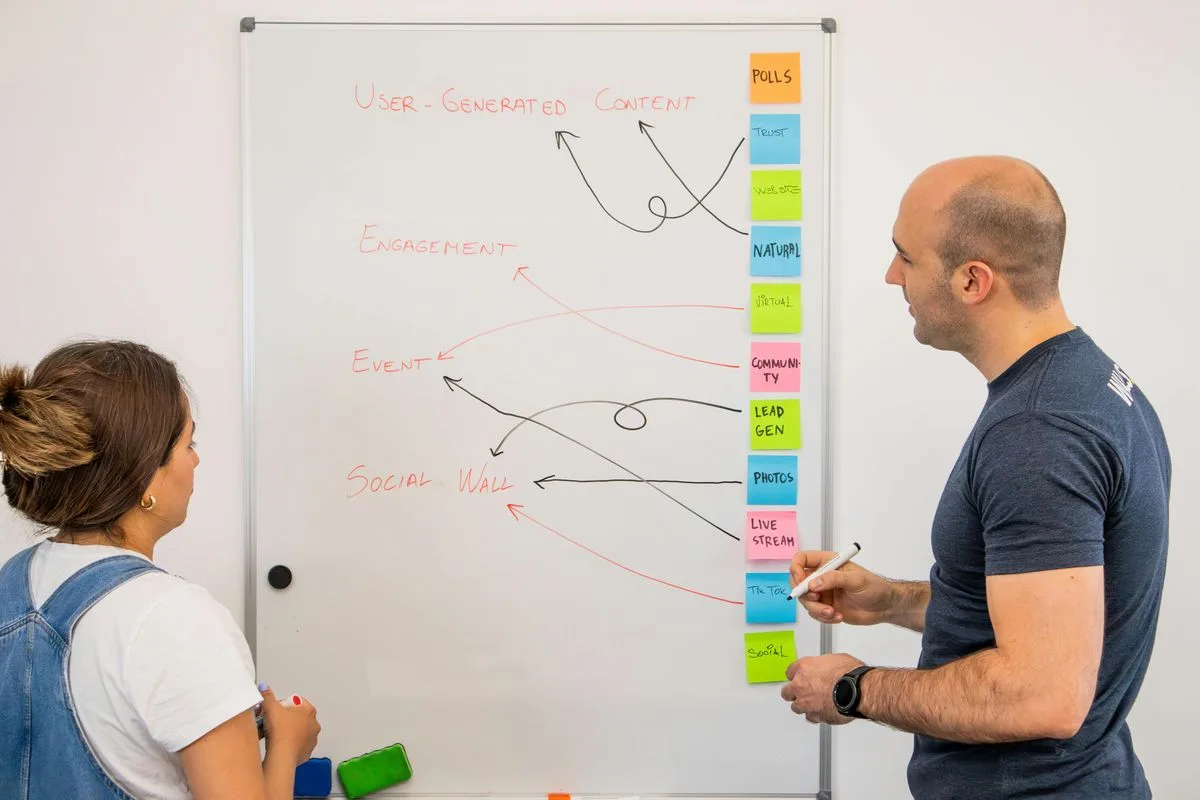Growleady Team
Lead Generation Experts
B2B Lead Generation: Strategies, Challenges, and Trends
Discover B2B lead generation essentials: strategies, emerging trends, challenges, and innovative technologies like AI-powered lead scoring.

B2B lead generation is crucial for attracting and retaining business customers. It's the secret sauce that keeps companies growing and thriving in today's competitive market.
B2B lead generation isn't just about cold calling or sending out mass emails. It's an art and science that involves identifying potential clients, sparking their interest, and nurturing relationships. Whether you're a seasoned pro or just starting out, understanding B2B lead generation is crucial for your business success.
Understanding B2B Lead Generation
B2B lead generation is the process of identifying and attracting potential business customers for your products or services. It's a crucial component of B2B marketing that focuses on creating interest and building relationships with other companies.
Defining B2B Leads
B2B leads are businesses or individuals within organizations who've shown interest in your offerings. These leads come in various forms:
Product Qualified Leads (PQLs): Companies that have used your product through a free trial or freemium version and exhibit behaviors indicating they're ready to become paying customers.
Service Qualified Leads: Businesses that express interest in your services, often through initial consultations or requests for more information.
Marketing Qualified Leads (MQLs): Organizations that have engaged with your marketing efforts and fit your ideal customer profile.
Sales Qualified Leads (SQLs): Prospects that have been vetted by your sales team and are deemed ready for direct sales outreach.
Understanding these lead types helps you tailor your approach and nurture each prospect effectively.
The Importance of Lead Generation in B2B Marketing

Lead generation is the lifeblood of B2B marketing. Here's why it's crucial:
Builds a sales pipeline: Consistent lead generation ensures a steady flow of potential customers, keeping your sales team busy and productive.
Increases brand awareness: Through various lead generation tactics, you're continuously putting your brand in front of potential clients.
Provides valuable market insights: The process of generating leads offers insights into your target audience's needs, preferences, and pain points.
Shortens sales cycles: By focusing on qualified leads, you spend less time on prospects unlikely to convert, making your sales process more efficient.
Improves ROI: Targeted lead generation efforts often result in higher conversion rates, leading to a better return on your marketing investment.
Common misconceptions about B2B lead generation include thinking it's all about cold calling or sending mass emails. In reality, it's a strategic process that involves multiple touchpoints and personalized communication.
To optimize your B2B lead generation:
Create high-quality, relevant content that addresses your target audience's pain points
Leverage LinkedIn for networking and sharing thought leadership content
Use email marketing to nurture leads with valuable information and offers
Carry out lead scoring to prioritize your most promising prospects
Align your sales and marketing teams for a seamless lead handoff process
Remember, effective B2B lead generation is about building relationships and providing value. It's not just about collecting contact information; it's about creating meaningful connections that lead to long-term business partnerships.
Key Strategies for B2B Lead Generation
Effective B2B lead generation relies on a multi-faceted approach to attract and engage potential customers. Here are four key strategies to boost your lead generation efforts:
Content Marketing
Content marketing is a powerful tool for attracting and nurturing B2B leads. By creating valuable, informative content, you'll position your brand as an industry authority and build trust with potential customers. Here's how to make the most of content marketing:
Create diverse content types: Develop whitepapers, blog posts, case studies, and videos to cater to different preferences and stages of the buyer's journey.
Focus on quality: Produce in-depth, well-researched content that addresses your audience's pain points and offers practical solutions.
Optimize for search: Use relevant keywords and follow SEO best practices to increase your content's visibility in search engine results.
Track engagement: Monitor metrics like clicks, shares, and time spent on page to gauge content performance and refine your strategy.
Social Media Marketing
Social media platforms offer excellent opportunities for B2B lead generation, allowing you to connect with potential customers and showcase your expertise. Here's how to leverage social media effectively:
Choose the right platforms: Focus on networks where your target audience is most active, such as LinkedIn for professional networking or Twitter for real-time industry updates.
Engage consistently: Share valuable content, participate in relevant discussions, and respond promptly to comments and messages.
Carry out social selling: Train your sales development representatives (SDRs) to connect with potential leads on social media and build relationships through thoughtful interactions.
Use paid advertising: Complement organic efforts with targeted ads to reach a wider audience and generate leads more quickly.
Email Marketing
Email remains a crucial channel for B2B lead generation, offering a direct line of communication to nurture prospects and guide them through the sales funnel. Here's how to create effective email campaigns:
Segment your list: Divide your email list based on factors like industry, company size, or stage in the buyer's journey to deliver more relevant content.
Personalize your messages: Use recipient data to tailor subject lines, greetings, and content to each segment's specific needs and interests.
Provide value: Share useful information, exclusive offers, or industry insights to keep subscribers engaged and encourage them to take action.
Optimize for mobile: Ensure your emails are responsive and easy to read on mobile devices, as many B2B decision-makers check email on the go.
Search Engine Optimization (SEO)

SEO is crucial for increasing your visibility in search results and attracting organic traffic to your website. Here's how to improve your B2B lead generation through SEO:
Conduct keyword research: Identify relevant, high-volume keywords that your target audience uses when searching for solutions in your industry.
Optimize on-page elements: Incorporate target keywords naturally into your page titles, meta descriptions, headers, and content.
Create quality backlinks: Develop relationships with industry publications, partners, and influencers to earn high-quality backlinks to your site.
Improve site speed and user experience: Ensure your website loads quickly and is easy to navigate, as these factors influence both search rankings and user engagement.
By implementing these key strategies, you'll create a robust B2B lead generation framework that attracts, engages, and nurtures potential customers throughout their buying journey.
Effective B2B Lead Generation Channels
B2B lead generation thrives on multiple channels to connect with potential customers. Here are some of the most effective channels for generating high-quality B2B leads:
LinkedIn for B2B Lead Generation
LinkedIn stands out as a powerhouse for B2B lead generation. It's a professional network where decision-makers gather, making it ideal for connecting with potential clients.
Tools like GrowLeady can enhance your LinkedIn strategy by providing advanced insights and automation features for more effective targeting. Here's how to leverage LinkedIn effectively:
Optimize your profile: Ensure your LinkedIn profile showcases your expertise and value proposition.
Share valuable content: Regularly post insightful articles, industry news, and thought leadership pieces.
Engage with your network: Comment on and share others' posts to increase visibility.
Use LinkedIn Sales Navigator: This tool helps you find and target the right prospects.
Personalize connection requests: Craft tailored messages when reaching out to potential leads.
Remember, LinkedIn isn't just about selling. It's about building relationships and establishing trust within your industry.
Industry Events and Trade Shows
Even though the digital age, face-to-face interactions remain crucial in B2B lead generation. Industry events and trade shows offer unique opportunities:
Pre-event preparation: Research attendees and schedule meetings in advance.
Engaging booth design: Create an attractive, interactive space that draws attention.
Live demonstrations: Showcase your product or service in action.
Collect contact information: Use digital tools to gather lead data efficiently.
Follow-up strategy: Plan your post-event outreach to nurture new connections.
Trade shows let you meet multiple potential clients in one place, making them a time-efficient lead generation channel.
Webinars and Virtual Events
With the rise of remote work, webinars and virtual events have become increasingly popular for B2B lead generation:
Choose relevant topics: Address pain points your target audience faces.
Promote effectively: Use email, social media, and paid ads to boost attendance.
Engage your audience: Incorporate polls, Q&A sessions, and interactive elements.
Provide value: Focus on educating attendees rather than hard selling.
Record for on-demand viewing: Extend the life of your content and capture more leads.
Webinars showcase your expertise while providing valuable information to potential clients, positioning you as a trusted industry resource.
Qualifying B2B Leads
Qualifying B2B leads involves assessing the likelihood of potential buyers converting into customers. It's a crucial step in streamlining your sales process and focusing efforts on the most promising prospects.
Lead Scoring
Lead scoring is a method to quantify the potential value of leads based on their characteristics and behaviors. Here's how to carry out an effective lead scoring system:
Assign point values to specific actions: Give higher scores for actions like downloading a whitepaper or attending a webinar.
Consider demographic factors: Industry, company size, and job title can indicate a lead's fit for your product or service.
Track engagement levels: Monitor email opens, website visits, and social media interactions.
Use negative scoring: Subtract points for actions that suggest disinterest, like unsubscribing from emails.
Carry out a dynamic system: Regularly update your scoring criteria based on new data and insights.
Remember, a high score doesn't guarantee a sale, but it helps prioritize your outreach efforts. Use lead scoring to guide your sales team's focus and improve conversion rates.
Lead Nurturing
Lead nurturing is the process of building relationships with potential buyers at every stage of the sales funnel. Here are effective strategies for nurturing B2B leads:
Personalize your communication: Tailor your messages based on the lead's industry, role, and interests.
Provide valuable content: Share relevant articles, case studies, and whitepapers that address your leads' pain points.
Use multi-channel approach: Engage leads through email, social media, and retargeting ads for a comprehensive nurturing strategy.
Carry out drip campaigns: Set up automated email sequences that deliver timely, relevant information based on the lead's stage in the buying process.
Offer product demos or free trials: Give leads hands-on experience with your solution to build trust and demonstrate value.
Follow up consistently: Maintain regular contact without being pushy. Find the right balance between staying top-of-mind and respecting their time.
By combining effective lead scoring and nurturing strategies, you'll be better equipped to identify and convert high-quality B2B leads. Remember, the key is to provide value at every touchpoint and guide prospects through their buying journey with relevant, timely information.
Measuring B2B Lead Generation Success
Measuring the success of your B2B lead generation efforts is crucial for optimizing your strategies and maximizing your return on investment. By tracking key metrics, you'll gain valuable insights into the effectiveness of your campaigns and identify areas for improvement.
Key Performance Indicators (KPIs)
To gauge the success of your B2B lead generation efforts, focus on these essential KPIs:
Conversion Rates: Track the percentage of leads that become customers. A higher conversion rate indicates more effective lead nurturing and sales processes.
Cost Per Lead (CPL): Calculate how much you're spending to acquire each lead. This helps you determine the efficiency of your lead generation tactics.
Lead Quality Score: Assign a score to leads based on their likelihood to convert. This helps prioritize high-potential prospects and allocate resources effectively.
Time to Conversion: Measure how long it takes for a lead to move through your sales funnel. Shorter conversion times often indicate more effective lead nurturing strategies.
Lead Source Performance: Analyze which channels or campaigns are generating the most valuable leads. This information helps you focus on the most productive lead generation methods.
ROI of Lead Generation Efforts
Calculating the return on investment (ROI) of your lead generation efforts is essential for justifying your marketing budget and refining your strategies:
Revenue Attribution: Track the revenue generated from converted leads back to specific campaigns or channels. This helps you identify which lead generation efforts are driving the most value.
Customer Lifetime Value (CLV): Consider the long-term value of acquired customers, not just the initial sale. This provides a more comprehensive view of your lead generation ROI.
Sales Cycle Length: Monitor how your lead generation efforts impact the length of your sales cycle. Shorter cycles often indicate more effective lead nurturing and qualification processes.
Cost Savings: Evaluate how your lead generation efforts reduce costs in other areas, such as sales team efficiency or reduced customer acquisition costs.
Lead-to-Opportunity Ratio: Measure the percentage of leads that progress to qualified opportunities. This metric helps assess the quality of your lead generation and qualification processes.
Remember, measuring B2B lead generation success isn't just about collecting data. It's about using these insights to continuously refine your strategies, allocate resources more effectively, and eventually drive more revenue for your business. By regularly analyzing these KPIs and ROI metrics, you'll be better equipped to make data-driven decisions and optimize your lead generation efforts for maximum impact.
Challenges in B2B Lead Generation
B2B lead generation comes with its own set of unique challenges. Identifying and overcoming these obstacles is crucial for developing an effective lead generation strategy.
Overcoming Common Obstacles
In B2B lead generation, you'll face several hurdles that can impede your progress. Here's how to tackle them:
Long sales cycles: B2B transactions often take months to close. To shorten the process:
Create targeted content for each stage of the buyer's journey
Use automation tools to nurture leads consistently
Offer personalized demos or trials to speed up decision-making
Limited target audience: Unlike B2C, your pool of potential customers is smaller. To maximize your reach:
Focus on quality over quantity
Develop ideal customer profiles (ICPs) to target the right companies
Leverage account-based marketing (ABM) strategies
Multiple decision-makers: B2B purchases involve various stakeholders. To navigate this:
Map out the decision-making unit in target companies
Create content that addresses concerns of different roles
Use social selling to build relationships with key influencers
Data quality issues: Inaccurate or outdated information can derail your efforts. To maintain clean data:
Regularly audit and update your CRM
Use data enrichment tools to fill in gaps
Carry out strict data entry protocols for your team
Budget constraints: B2B lead generation can be costly. To optimize your budget:
Focus on organic strategies like content marketing and SEO
Leverage social media for cost-effective outreach
Analyze ROI of different channels and double down on top performers
Generating high-quality leads: Not all leads are created equal. To improve lead quality:
Carry out lead scoring to prioritize prospects
Use intent data to identify companies actively searching for solutions
Create gated content to attract serious buyers
Standing out in a crowded market: Differentiation is key in B2B. To cut through the noise:
Develop a unique value proposition
Showcase customer success stories and case studies
Offer thought leadership content to establish authority
Aligning sales and marketing: Misalignment can lead to lost opportunities. To foster collaboration:
Establish clear definitions for qualified leads
Hold regular sales and marketing alignment meetings
Use closed-loop reporting to track lead progress
By addressing these common obstacles, you'll be better equipped to create a robust B2B lead generation strategy. Remember, the key is to constantly analyze, adapt, and refine your approach based on results and changing market conditions.
The Future of B2B Lead Generation
B2B lead generation is evolving rapidly, driven by technological advancements and changing buyer behaviors. As businesses adapt to new market dynamics, the future of B2B lead generation promises exciting opportunities and challenges.
Emerging Trends and Technologies
The B2B lead generation world is transforming with innovative approaches and cutting-edge tools. Here's what's shaping the future:
AI-powered lead scoring: Artificial Intelligence algorithms analyze vast datasets to predict which leads are most likely to convert. This technology helps you focus your efforts on high-potential prospects, saving time and resources.
Conversational marketing: Chatbots and AI-driven messaging platforms are revolutionizing how businesses interact with potential leads. These tools provide instant, personalized responses to inquiries, qualifying leads 24/7.
Account-based marketing (ABM): This targeted approach focuses on specific high-value accounts rather than casting a wide net. ABM aligns sales and marketing efforts to create personalized campaigns for key decision-makers within target companies.
Video marketing: With attention spans shrinking, video content is becoming increasingly crucial for lead generation. From explainer videos to personalized video messages, this format engages prospects more effectively than text alone.
Voice search optimization: As voice-activated devices become more prevalent, optimizing your content for voice search is essential. This means focusing on natural language and long-tail keywords that match how people speak.
Predictive analytics: Advanced data analysis tools help identify patterns and trends in customer behavior, allowing you to anticipate needs and tailor your lead generation strategies accordingly.
Hyper-personalization: Going beyond basic segmentation, hyper-personalization uses AI and machine learning to create highly targeted content and experiences for individual leads based on their specific behaviors and preferences.
LinkedIn automation: With LinkedIn being the go-to platform for B2B networking, automation tools are emerging to streamline outreach and engagement. These tools help you connect with potential leads at scale while maintaining a personal touch.
Interactive content: Quizzes, assessments, and calculators are becoming popular lead generation tools. They provide value to prospects while capturing valuable data for your sales team.
Privacy-compliant data collection: As data privacy regulations tighten, businesses are developing new ways to collect and use first-party data ethically and transparently.
By embracing these emerging trends and technologies, you'll position your B2B lead generation efforts at the forefront of innovation. Remember, the key is to balance new technologies with tried-and-true relationship-building strategies. Experiment with these trends, but always prioritize providing genuine value to your potential leads.
Conclusion
B2B lead generation is an ever-evolving field that demands adaptability and innovation. By embracing emerging trends and technologies while maintaining a strong focus on relationship-building you'll position your business for success. Remember effective B2B lead generation isn't just about quantity but quality. It's about finding the right prospects, nurturing them, and guiding them through the sales funnel.
As you carry out these strategies, stay agile and be prepared to adjust your approach based on results and market changes. With a well-crafted B2B lead generation strategy, you'll be well-equipped to drive growth, expand your customer base, and achieve your business objectives in today's competitive world.
Frequently Asked Questions
What is B2B lead generation?
B2B lead generation is the process of identifying and attracting potential business customers (leads) for your products or services. It involves various strategies like content marketing, email campaigns, and social media outreach to generate interest and gather contact information from prospective clients in other businesses.
Why is content marketing important for B2B lead generation?
Content marketing is crucial for B2B lead generation because it helps establish your company as an industry authority, builds trust with potential clients, and provides valuable information to address their pain points. By creating and sharing relevant, high-quality content, you can attract and engage potential leads throughout their buyer's journey.
How can AI improve B2B lead generation?
AI can enhance B2B lead generation by automating and optimizing various processes. It can power lead scoring systems to identify high-quality leads, enable chatbots for 24/7 customer engagement, analyze large datasets for insights, and personalize marketing efforts at scale. AI helps streamline lead generation, making it more efficient and effective.
What is account-based marketing (ABM) in B2B lead generation?
Account-based marketing (ABM) is a targeted approach in B2B lead generation that focuses on specific high-value accounts rather than casting a wide net. It involves tailoring marketing efforts and content to the needs and characteristics of individual target companies, resulting in more personalized and effective lead generation campaigns.
How does video marketing contribute to B2B lead generation?
Video marketing boosts B2B lead generation by providing engaging, easily digestible content that can explain complex products or services. It helps build trust, increases brand awareness, and can be used across various platforms. Videos can include product demos, customer testimonials, or educational content, all of which can attract and nurture potential leads.
What role does LinkedIn play in B2B lead generation?
LinkedIn is a powerful platform for B2B lead generation due to its professional focus. It allows businesses to connect with decision-makers, share industry insights, and build credibility. LinkedIn automation tools can help streamline outreach efforts, while targeted advertising and content sharing can attract potential leads within specific industries or job roles.


